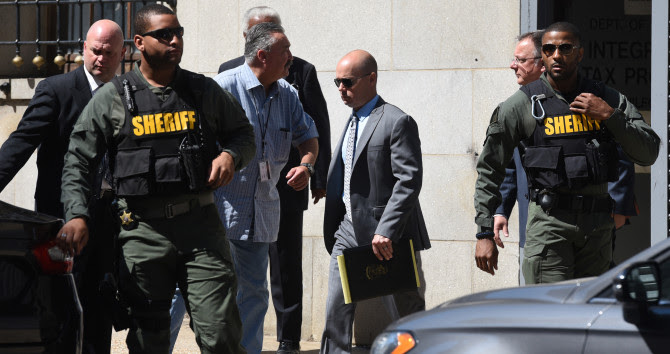 Baltimore Police Lt. Brian Rice (center) is escorted from the courthouse to a waiting car after being found not guilty on all charges related to the death of Freddie Gray July 18, 2016, in Baltimore. Jerry Jackson/Baltimore Sun/TNS via Getty Images
Baltimore Police Lt. Brian Rice (center) is escorted from the courthouse to a waiting car after being found not guilty on all charges related to the death of Freddie Gray July 18, 2016, in Baltimore. Jerry Jackson/Baltimore Sun/TNS via Getty ImagesOn Monday, Police Lt. Brian Rice became the third officer acquitted in the death of Freddie Gray.
Rice, 42, was the highest-ranking officer of six officers charged in Gray’s death. He was charged with involuntary manslaughter, reckless endangerment and misconduct in office, and of those charges, he was acquitted on all of them.
Citizens and protesters alike have asked: How can someone go into police custody alive, leave police custody in a coma, eventually die from a spinal cord injury and have the medical examiner rule the death a homicide, and yet the police officers involved in his arrest and transport continue to walk on the charges? How can the officers be liable in a civil suit to the family, but continue to be acquitted in a criminal case?
The crux of the Rice case, and the next two cases against police officers to come, boil down to whether the decision not to seat belt Freddie Gray in a police van was a criminal violation. The prosecution argued that not seat belting him was a breach of police general orders, and that throwing Gray headfirst into the van shackled and handcuffed and unable to brace himself for a sudden turn or stop put him in danger. They argue that subsequently, Rice violated both the constitution and police policy that states he is responsible for the safety of a detainee.
The defense argued that Rice did not open an email that stated that officers must secure detainees with a seat belt. The defense also argued that at the scene of the arrest, Gray was so volatile Rice would have been in danger if he had taken the time to seat belt him. They argued that Rice’s focus was on maintaining order and getting the van away from what he perceived to be a hostile crowd. And that that is what any “reasonable” officer would have done when presented with a similar situation.
Because this case is focused around something the officers didn’t do (maintain Gray’s safety) and without video evidence of a so-called rough ride (much of the closed-circuit TV footage was erased as is standard on a 72-hour cycle), the prosecution has to prove what was Rice’s state of mind—in other words that he intentionally wanted to cause Gray harm.
“This crime was a crime of omission, rather than commission,” said University of Baltimore law professor David Jaros. “It’s a very hard case to convict on.”
According to Judge Barry Williams, who is presiding over the case in a bench trial, the state has yet to prove beyond a reasonable doubt that Rice, or any of the previous officers, intended for Gray to suffer injuries.
There is civilian testimony and cellphone footage that points to places where Rice was hostile toward the crowd, threatening to use a Taser on Gray’s friend Brandon Ross and take him to jail for protesting his friend’s treatment. And there’s audio of someone in the crowd saying: “I’ll bust all three of them.”
However, without police testimony saying there was a rough ride or that any of the officers intended to cause Gray harm, the case is reduced to circumstantial evidence.
“You have prosecutors having to rely on the police in order to prosecute police,” said attorney J. Wyndal Gordon, who has followed the case. “You have hostile witnesses compelled to testify that are extremely recalcitrant. With the Police Officers Bill of Rights, officers have 10 days to give a statement and obtain counsel. What you’re left with is civilian testimony.”
The prosecution wasn’t allowed to argue that civil suits relating to “rough rides” have cost taxpayers millions of dollars in settlements for passengers who were not in seat belts in Baltimore City, without having witnesses who could testify that they had warned the police department that not seat belting passengers was becoming a liability.
The likelihood for convictions in the next three cases is very slim, but legal experts still see the indictments as a beginning for police reform. The next case, which is to begin Monday, is for Police Officer Garrett Miller, one of the initial arresting officers. The trial for Police Sgt. Alicia White will follow, and Police Officer William Porter will be retried after a hung jury couldn’t reach a decision in his trial last December.
“Just because you bring a prosecution doesn’t mean you’re going to win,” Gordon said regarding the importance of these cases. “She [Baltimore City State’s Attorney Marilyn Mosby] sent a message, and I think they got it. If you remain committed to that message and strong in your ideals that this kind of behavior won’t be tolerated, then you would have done a great service to your constituents.”
Ericka Blount Danois is an award-winning journalist, writer, editor and professor. You can see more of her work at her website. Follow her on Twitter.














